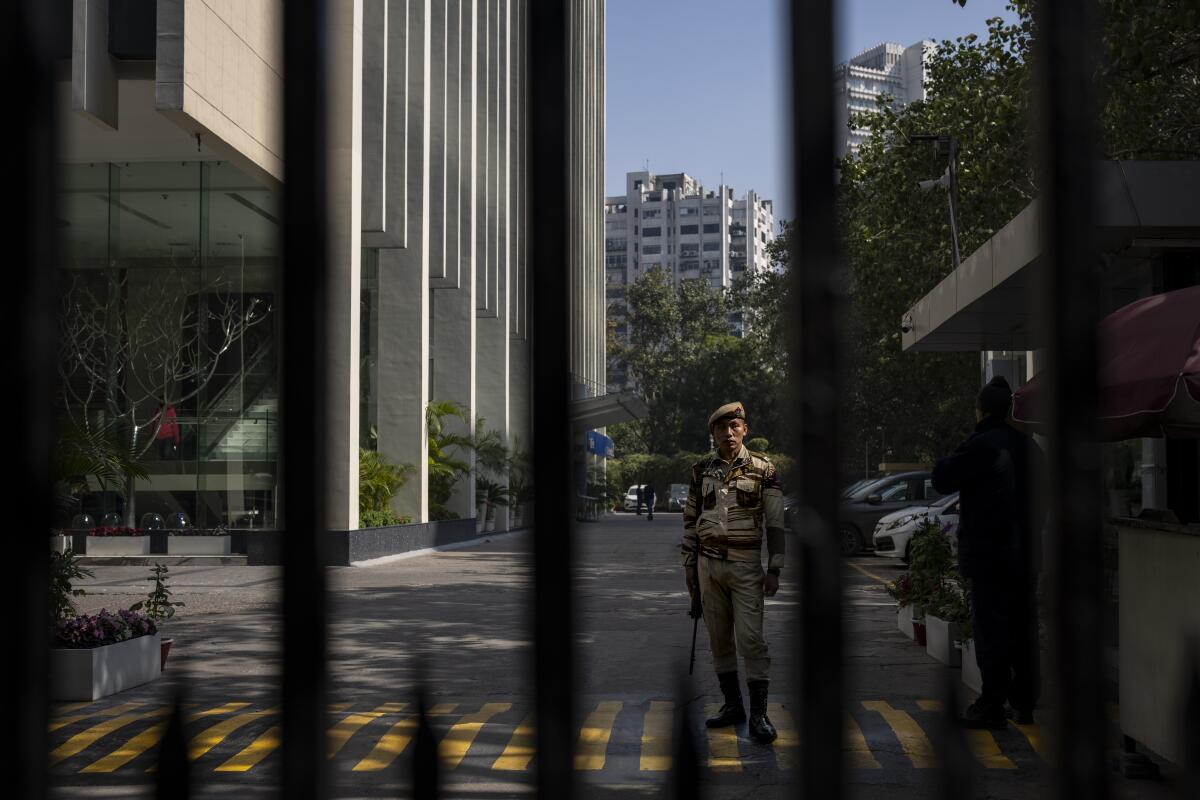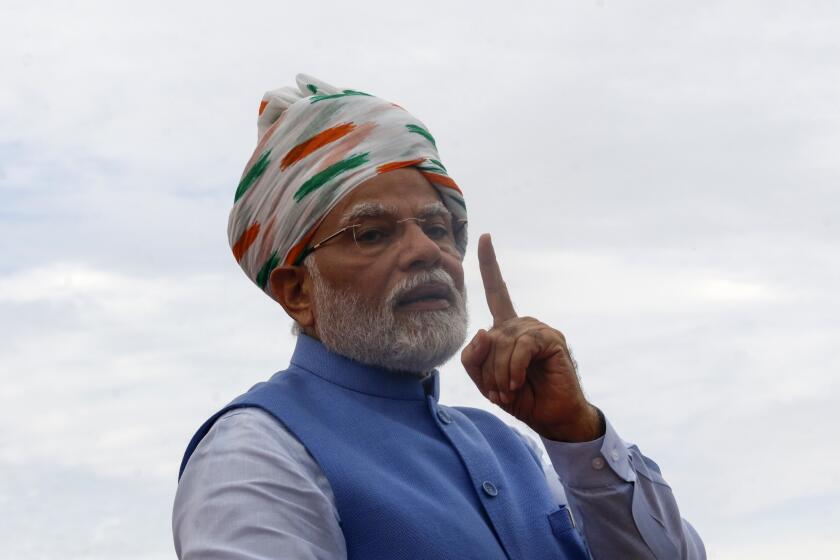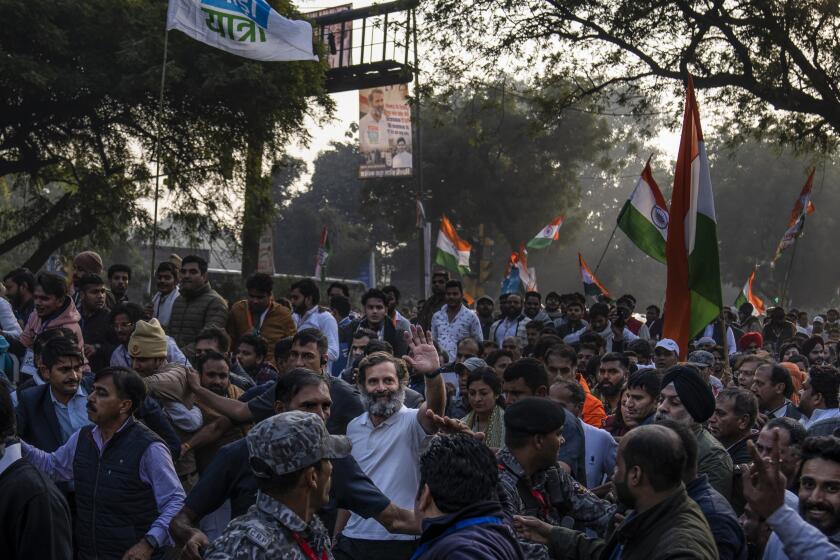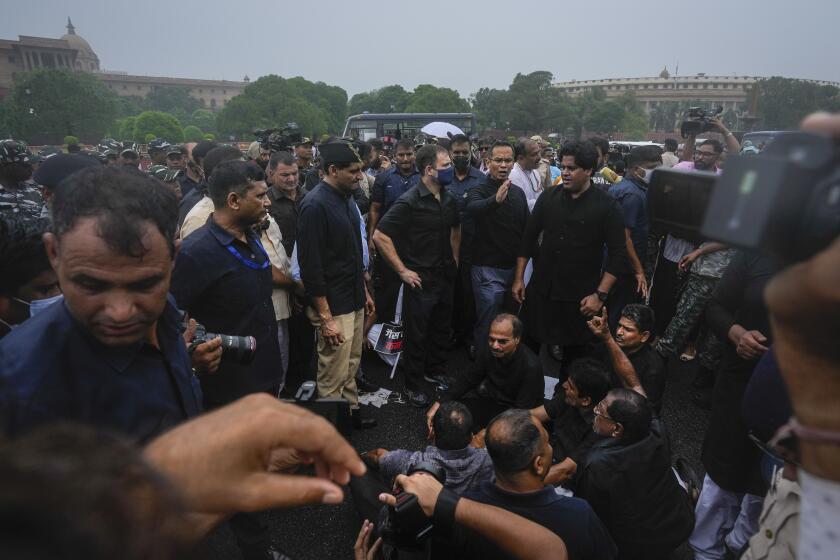BBC’s India offices searched in tax probe after broadcast of program critical of Modi

- Share via
NEW DELHI — Indian tax officials searched the BBC’s offices in New Delhi and Mumbai for a third straight day Thursday seeking information about the broadcaster’s business operations amid allegations of tax evasion, as opposition political parties and other news organizations criticized the move as an attempt to intimidate the media.
Some BBC news staff members were questioned overnight, but the tax officials Thursday restricted themselves to the company’s business executives and their offices, said some staff members who spoke on condition of anonymity because they weren’t authorized to speak to the media.
Indian Prime Minister Narendra Modi’s critics questioned the timing of the searches, which came weeks after the BBC aired a documentary in Britain critical of Modi.
Kanchan Gupta, an advisor to India’s Information and Broadcasting Ministry, said there was no connection between the two.
“Whether you are a media organization or you are a manufacturer, the purpose of tax laws apply equally to everybody. And if you are found in violation of those tax laws, the appropriate action is taken as the due process of law,” Gupta said in an interview with the Mirror Now news channel.
The Indian tax department has not issued any statement on what prompted the searches of the BBC offices, which began Tuesday morning.
As a billionaire close to the prime minister nears acquisition of NDTV, India’s last independent mainstream TV network, many fear for journalism.
Britain’s publicly funded national broadcaster said Tuesday that it was cooperating fully with Indian authorities and hoped “to have this situation resolved as soon as possible.”
“Many staff [have] now left the building but some have been asked to remain and are continuing to cooperate with the ongoing inquiries,” the BBC said, adding: “Our output and journalism continue as normal.”
BBC management told editorial and other staff members to work from home.
The Press Trust of India news agency cited unnamed officials as saying Thursday that investigators collected financial data from some BBC staffers and made copies of electronic and paper data from the news organization.
Rahul Gandhi says India’s right-wing government is dividing the country along religious lines. Followers hope his cross-country march can save democracy.
The search is being carried out to investigate issues related to international taxation and transfer pricing of BBC subsidiary companies, the Press Trust said.
India’s News Broadcasters and Digital Assn. criticized the searches.
While the association “maintains that no institution is above the law, it condemns any attempt to muzzle and intimidate the media and interfere with the free functioning of journalists and media organizations,” it said in a statement Wednesday.
The leader of the main opposition Congress party, Mallikarjun Kharge, described the government action as an assault on freedom of the press under Modi’s government.
The Indian government is considering regulations that would require online social media platforms to take down content considered unlawful or face sanctions.
Reporters Without Borders, an international media watchdog, denounced the Indian government’s action as “attempts to clamp down on independent media.”
“These raids have all the appearance of a reprisal against the BBC for releasing a documentary critical of Prime Minister Narendra Modi three weeks ago. They have come at a time when independent media are being hounded more and more, and when pluralism is shrinking in India due to increased media concentration,” the group said in a statement Thursday.
The documentary, “India: The Modi Question,” was broadcast in Britain last month and examines the prime minister’s role in the 2002 anti-Muslim riots in the western state of Gujarat, where he was chief minister at the time. More than 1,000 people were killed in the violence.
Modi, who leads a Hindu nationalist party, has denied allegations that authorities under his watch allowed and even encouraged the bloodshed, and the Supreme Court said it found no evidence to prosecute him. Last year, the court dismissed a petition filed by a Muslim victim questioning Modi’s exoneration.
News Alerts
Get breaking news, investigations, analysis and more signature journalism from the Los Angeles Times in your inbox.
You may occasionally receive promotional content from the Los Angeles Times.
The second portion of the two-part documentary examined “the track record of Narendra Modi’s government following his re-election in 2019,” according to the BBC website.
The program drew an immediate backlash from New Delhi, which invoked emergency powers under its information technology laws to block it from being shown in India. Local authorities scrambled to stop screenings organized at Indian universities, and social media platforms including Twitter and YouTube complied with government requests to remove links to the documentary.
The BBC said at the time that the documentary was “rigorously researched” and involved a wide range of voices and opinions.
“We offered the Indian Government a right to reply to the matters raised in the series — it declined to respond,” its statement said.
Since its independence in 1947, India has transformed from a poverty-stricken nation into one of the world’s fastest-growing economies.
India’s Foreign Ministry called the documentary a “propaganda piece designed to push a particularly discredited narrative” that lacked objectivity.
Press freedom in India has been on a steady decline in recent years. The country fell eight places, to 150 out of 180 countries, in the 2022 Press Freedom Index published by Reporters Without Borders. Media watchdog groups accuse the Modi government of silencing criticism on social media under a sweeping internet law that puts digital platforms, including Twitter and Facebook, under direct government oversight.
Some media outlets critical of the government have been subjected to tax investigations.
Authorities searched the offices of the left-leaning website NewsClick and independent media portal Newslaundry on the same day in 2021. Tax officials also accused the Dainik Bhaskar newspaper of tax evasion in 2021 after it published reports of mass funeral pyres and floating corpses that challenged the government’s handling of the COVID-19 pandemic.
In 2017, the government’s investigation bureau said it was probing cases of loan defaults when it raided the offices of New Delhi Television, known for its liberal perspective.
More to Read
Sign up for Essential California
The most important California stories and recommendations in your inbox every morning.
You may occasionally receive promotional content from the Los Angeles Times.
















